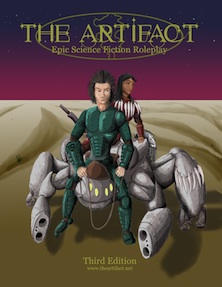 I’ve been asked this many times and I’ve tried to give a meaningful answer. I’ve said things like “my own” but never had a good way of quickly saying what I was using an why.
I’ve been asked this many times and I’ve tried to give a meaningful answer. I’ve said things like “my own” but never had a good way of quickly saying what I was using an why.
It’s not the system it’s the story
I’ve heard this pretty regularly for a little while now. I’d love that to be the case but there are a few great stories out there that have been pared with the wrong system and suffered for it. A.L. over at Reality Refracted had several great posts about how mechanics alter the story of a game and even help to tell the story. I completely agree with him. I’m not opposed to the idea of porting games to other systems but to get it right would take brilliance or a lot of brutally hard work.
What I’m getting at is that when I make a game, the setting and the mechanics need to match. Not just any system would do.
What’s in a name
Names are really quite powerful, not by themselves mind you but when properly attached to what they represent they do a lot. For example, if I say “the d20 system” most gamers instantly have a lot of information that they can work with to understand what I’m talking about. I have to admit that I failed to recognize the importance of a name for a system and that’s why I’ve only occasionally thought about giving my systems names.
The Fraction Column System
There are a lot of things that The Artifact RPG’s system does that is important to telling it’s story but it’s powerhouse mechanic is the Fraction Column. Let me show you why.
When playing other games, I have to admit that I was a rules lawyer (I’m better now) and one of my worst habits was to make my characters unbeatable. I found ways to do this in most systems that I played. Some systems were better than others but I wanted to do better.
Let’s take a situation. A basic level character is trying to catch a tiger using a tranquilizer gun. The animal is very fast and will almost always be able to avoid the dart because of a high Reflex. To make this work in most games, the attributes (or skills or traits) would have to be close to each other. In the Fraction Column system they can be very different and the task can still be accomplished.
Frank
| Attribute | Full | 1/2 | 1/4 | 1/8 |
| Agility | 30 | 15 | 8 | 4 |
Frank’s Agility is 30 on a 1d100 (roll under the target number) he has a 30% chance of base success but it doesn’t end there. If the Player rolls lower than his Fraction Columns he does even better.
the Tiger
| Attribute | Full | 1/2 | 1/4 | 1/8 |
| Reflex | 100 | 50 | 25 | 13 |
The tiger’s Reflex (used to dodge) is 100. On a 1d100 the Tiger would always succeed (except for on a roll of 100 which we count as an automatic failure).
Normally Frank could never hit the tiger without the benefit of his Fraction Columns. Lets say Frank gets a great roll of an 8 on a 1d100. He’s just made his 1/4 column and the tiger has to match it or do better to dodge. The tiger’s 1/4 column is a 25, so it has a better chance than Frank does, but it’s not an automatic success at this point.
This does a lot to a game’s story. Even very advanced characters are not immune to danger and that changes the mood and adds to the gritty feeling of the game.
So now, when someone asks me what system I’m using, I’ll answer “The Fraction Column System”. Then they’ll look at me and say “I’ve never heard of it.” Hey, gotta start somewhere.. .


 The Free RPG Blog
The Free RPG Blog
Pingback: Past 100 | The Artifact RPG